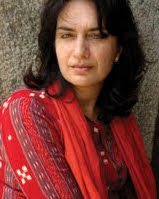Every reader's opinion matters to me. As and when you
do read the book please leave your feedback as a
comment on this thread. If you have any questions
about the book I'll be happy to answer them.
But please, please do take care
while commenting not to reveal too much of
the story and spoil it for others
who have not yet read the book.
Looking forward to your comments.
Monday, October 26, 2009
Subscribe to:
Post Comments (Atom)


I liked Come, Before Evening Falls. Manjul has told the story beautifully, highlighting important aspects of the Haryana Jat culture. Yet, all the facts are well integrated into the story. At no point do they become overwhelming or the reader feels talked down upon. Though the culture is simultaneously loud and silent, the story is lyrical. Manjul has achieved the critical balance, guess her training as a poet helps. Congratulations!
ReplyDeleteI liked Manjul basing the larger story on 'become something then'. A call that most of us, being sons and daughters, would recognise. The book depicts the characters of Tau, Jugni, Raakha, Raakha's mother with realistic irony. The way Manjul shows Jugni's intensity grow seemed to be a penetration of someone behind a veil. Using interior monologue to depict her worked very well as a tool. Kudos also for using simple language so evocatively and bringing forth the life of an important community of India to English readers.
All best!
Aman, author Sepia Leaves
www.amandeepsandhu.com
Dear Manjul,
ReplyDeleteJust had to let you know that I finished the book last night and really liked it. You have done a great job with it.
The fact that the book was set up in rural Haryana and in the early 20th century must have been difficult to handle. Did you have to do a lot of research? All that stuff about 7 kinds of clothes and utensils and things like that - must have taken a lot of work? However, it was pretty smooth - and at no time do I feel that the story, the dialogues, or the language were not in sync. That the central theme wasn't quite outdated kept the book relevant.
My favorite part was the post Jugni - Rakha clash in his room. The following 30-40 pages were beautiful - full of thought provoking philosophizing (largely by Jugni). Many quotable quotes there. It was like that you had poured the sum of all your life experiences in those 40 pages.
Another thing I particularly liked was that how there were no stereotypes and how the reader's predicability was challenged. They didn't quite turn out like that. They were all different shades of grey - as human beings in real life tend to be.
So, even though the book did start off like a chic lit (and the summary of the book on the cover also wants you to believe that it is a chic lit), but it quickly developed more depth and then, of course the end was the best part (and it is funny how you remember the end of a book the best) - unexpected, dramatic and powerful.
So, more power to your pen Manjul. It was a pleasure reading the book.
Warm regards.........Anu and Rajat
Beautiful! “Come before Evening falls” is an honest depiction of the north India of early twentieth century – a making of its times and minds. The strength of the work lies in the writer’s ability to maintain the objectivity of the period, without subjecting it to an opinionated brief or a comment on contemporary value system.
ReplyDeleteManjul Bajaj deserves all acclaim for this venture, as born and brought up in an urban India that is celebrating its wiz and boom; she has delved deeper into the rural reality – its history and sociology. Especially at a time when modernism is usurping the traditional and classical core, the author has succeeded in re-establishing the same through poignant characterization and a well-crafted plot.
The protagonists in the novel stand out in the form of two strong women, Jugni and Dadi, as opposed to men – who are crafty, patronizing, dominating yet internally weak and timid.
And there is the patron of Kala Sand, Naib Singh - an epitome of the classical and the traditional. He exists throughout the narrative in the surreal and forms the core of the novel.
Dear Manjul,
ReplyDeleteI belong to Jat Community & Meham region on whose backdrops you have written this masterpiece.I think this is the first English Novel which has been written on Jat Community & about Meham.
I can confidently say that this is as authentic account of Jats culture & traditions as it can be and true picture & portrait of their heritage.
Unfortunately very few local people are aware of this book. Nevertheless, my heartfelt compliments to you for such an excellent litrary work. Wishing you all the best for your future endeavours.
warm regards
Col Jangbir Singh Rangi
9650296300
rangijangbir@hotmail.com